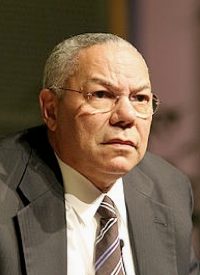
Former Secretary of State Colin Powell (left) took sharp issue Sunday with what he called “cheap shots” at him and other officials in the Bush administration by Dick Cheney in the former Vice President’s memoir, In My Time, scheduled to be released this week. In an interview on CBS’s Face the Nation.
Powell told host Bob Schieffer that if certain “White House operatives” and members of the Vice President’s staff had been more forthcoming, the appointment of a special prosecutor to investigate who leaked the identity of CIA agent Valerie Plame would not have been necessary and the investigation would have been shortened by more than two years. Powell made that comment while responding to Cheney’s statement in his book that Powell preferred to express his doubts and differences with administration policy to others, rather than directly to the President.
“It was as though he thought the proper way to express his views was by criticizing administration policy to people outside the government,” Cheney wrote about the former head of the State Department.
“I supported the President’s decisions. I gave the President my best advice,” Powell said, adding that the Cheney memoir attempts put the blame for “the Valerie Plame affair” on Powell and Deputy Secretary of State Richard Armitage. That controversy erupted in July 2003 after former ambassador Joseph C. Wilson 4th wrote an op ed piece in the New York Times describing a trip he had undertaken the previous year at the request of the CIA. Wilson went to the African nation Niger to investigate a report that Niger had agreed to sell uranium to Iraq, increasing concerns that Iraq was attempting to create nuclear weapons. Wilson said his conclusion, which he reported to the CIA, was that “it was highly doubtful that any such transaction had ever taken place. Given the instruction of the consortiums that operated the mines, it would be exceedingly difficult for Niger to transfer uranium to Iraq,” Wilson wrote in his New York Times article, published on July 6, 2003.
By that time U.S. and allied forces had invaded Iraq and toppled the regime of Saddam Hussein in a war based mainly on allegations that the regime possessed and was developing “weapons of mass destruction.” The weapons never were discovered and Wilson’s article fueled speculation that the Bush administration had manipulated intelligence reports to make the case for going to war. In his State of the Union Address in January 2003, Bush cited the British government as the source of the intelligence concerning the uranium purchase.
“The British government has learned that Saddam Hussein recently sought significant quantities of uranium from Africa,” the President said. The African nation was later identified as Niger.
Wilson said the CIA had asked him to make the trip to Niger to satisfy questions raised by the Vice President about the reported uranium sale. Cheney said he had no knowledge of the mission until he read Wilson’s article in the Times. Columnist Robert Novak revealed that Wilson’s wife, Valerie Plame worked for the CIA and suggested that perhaps she had arranged the trip. Since that information was classified, an investigation into who leaked Plame’s status as a CIA operative followed. Armitage told Novak about Plame, but the FBI and, later. the special counsel investigated others who may have planted the story.
When questioned by the FBI in May 2004, Cheney was shown a clipping he had made of the Wilson article in which he had written notes in the margins questioning the seriousness of Wilson’s investigation. “Or did his wife send him on a junket?” was one of the questions he wrote over the article. Cheney said he had learned Plame worked in the CIA unit that planned Wilson’s trip from a conversation he had with CIA Director George Tenet. He denied mentioning it to any journalist, however, and said that his practice was not to talk to journalists except when appearing on TV talk shows. The Vice President’s Chief of Staff, I. Lewis “Scooter” Libby was later tried and convicted of perjury, obstruction and lying to the FBI during the investigation and was sentenced to 30 months in prison and a $250,000 fine. President Bush commuted the prison sentence.
During his interview with the FBI, Cheney was asked about a note in his handwriting, made after White House press secretary Scott McClellan had said the President’s political advisor, Karl Rove, was in no way involved in the Plame leak. Cheney wrote of efforts to “sacrifice the guy that was asked to put his neck in the meat grinder because of the incompetence of others…” According to the FBI summary, Cheney explained the reference was to Libby, “who was forced to respond to numerous media inquires involving Joe Wilson because of the incompetence of the CIA.”
In his interview on Sunday, Powell said as soon as Armitage realized that he was the source for the Novak column, Powell and Armitage notified the Justice Department.
And so, if the White House operatives had come forward as readily as Mister Armitage had done then we wouldn’t have gone on for two more months with the FBI trying to find out what happened in the White House. There wouldn’t have been special counsel appointed by the Justice Department who spent two years trying to get to the bottom of it. And we wouldn’t have the mess that we subsequently had. And so if the White House and the operatives in the White House and Mister Cheney’s staff and elsewhere in the White House had been as forthcoming with the FBI as Mister Armitage was, this problem would not have reached the dimensions that it reached.
Powell did not name the “operatives in the White House” or on Cheney’s staff he was describing.
In disputing Cheney’s claim that he voiced his concerns about policy decision to those outside the administration rather than to the President, Powell brought up what came to be known as the “pottery barn analogy” concerning the war with Iraq.
“Mister Cheney may forget that I’m the one who said to President Bush, ‘If you break it, you own it.’ And you’ve got to understand that if we have to go to war in Iraq, we’ve (got) to be prepared for the whole war, not just the first phase,” Powell said. “And Mister Cheney and many of his colleagues were not prepared for what happened after the fall of Baghdad.” Powell said he persuaded the President to take the case against Iraq to the United Nations. “Mr. Cheney went out immediately after the President made that decision and undercut it by giving two speeches to veterans groups that essentially said he didn’t believe it would work. It’s not the way you support a President.”
Powell also recalled his own speech at the United Nations, though it included a description of a mobile weapons production facility in Iraq, later recanted by the alleged eyewitness, and an account of Iraq training al Qaeda in the use of chemical and biological weapons, also recanted by the source, whose “confession” was beaten out of him by interrogators in Egypt.
“Well, who went to the United Nations and, regrettably, with a lot of false information?” Powell said. “It was me, it wasn’t Mister Cheney. I supported the President. I supported the President’s decisions. I gave the President my best advice.”
Cheney has also taken credit for Powell’s decision to leave the State department early in 2005, the former Secretary said, though he had long since informed President Bush that he would only serve through the President’s first term. He stayed around a few months into the second term, he said, because there were conferences he wanted to attend and because Condoleezza Rice had not yet been confirmed as his successor. He criticized Cheney for taking “cheap shots” at others in the administration as well.
“Well he’s taken the same shots at Condi, with an almost condescending tone. She tearfully did this, or that. And he’s taken the same shots at George Tenet. And he has also, in some ways, indicated he didn’t always approve of what President Bush was deciding.” Powell also found offensive the former Vice President’s assertion that his book will have “heads exploding all over Washington.”
“That’s quite a visual and in fact, the kind of headline I would expect to come out a gossip column, that’s the kind of headline you might see one of the super market tabloids write,” he said. “It was not the kind of headline I would have expected to come from a former Vice President of the United States of America.” Based on what he has read in the newspapers and heard on TV thus far, the book is “essentially a rehash of the events of seven or eight years ago,” said Powell, who seemed to find it more annoying than explosive.
“My head isn’t exploding and I haven’t noticed any other head is exploding in Washington, DC,” he said.



